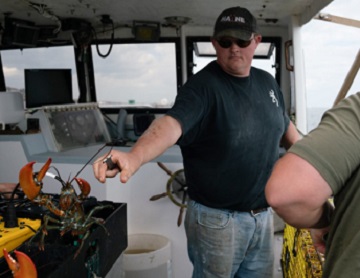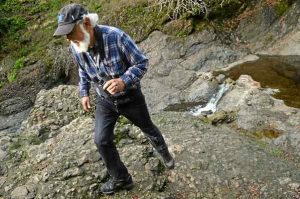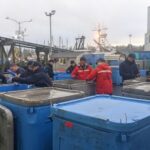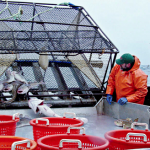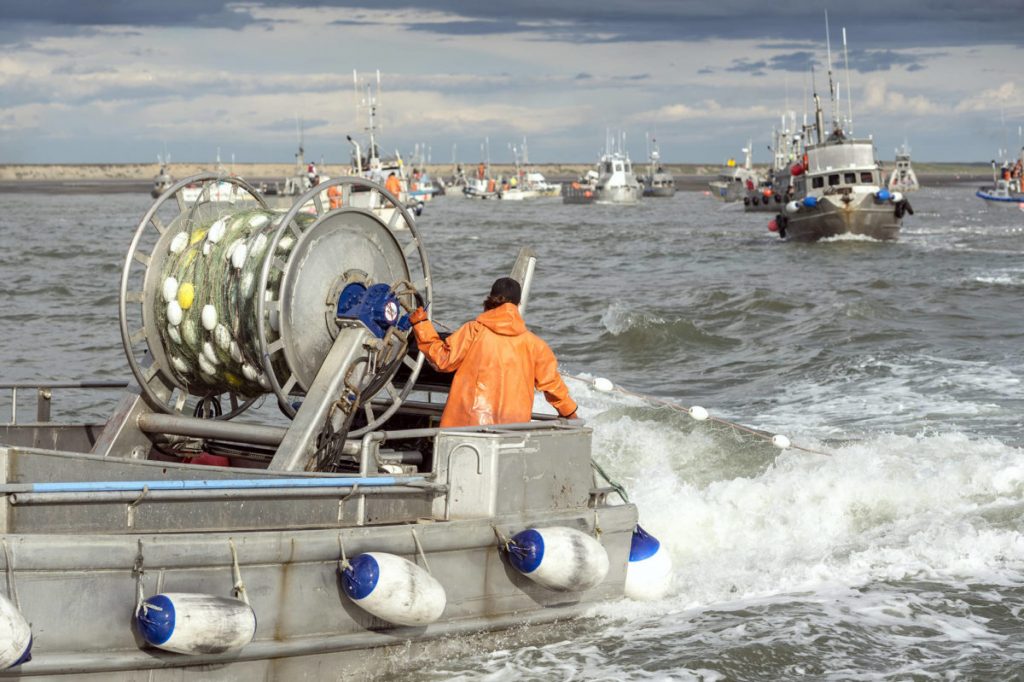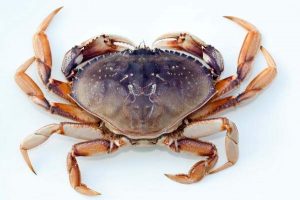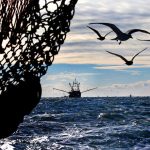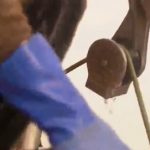Tag Archives: lobster industry
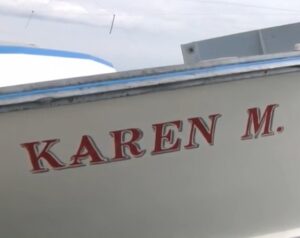
Massachusetts lobster industry feels impact of right whale protections
If you live in Massachusetts and you want locally caught lobster on Mother’s Day weekend, you’ll be out of luck. Commercial lobstering in Massachusetts waters is off-limits until later in May, which means, for the time being, any lobster being sold in Massachusetts has to be caught in Canadian waters. “It’s getting harder and harder every year,” lobsterman Tom Reilly said. “They make it more and more difficult for us with the closures.” Video, >click to read< 09:19
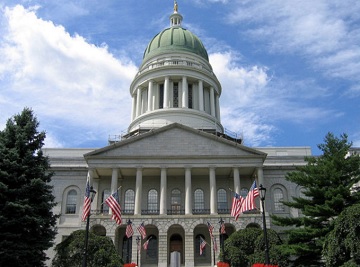
$30 million relief fund for lobstermen gets initial nod in Maine House
Starting on May 1, lobstermen in Maine will have to begin using weaker rope or special links on traplines that are designed to allow a whale to break free from fishing gear. The new federal regulations are aimed at preventing endangered North Atlantic right whales from potentially deadly entanglements. Rep. Billy Bob Faulkingham, a fisherman from Winter Harbor in Hancock County, said the proposed $30 million fund from the state will help mitigate the costs for an iconic industry that generates more than $1 billion for the state. “We are going to be hurting for the money to comply with those rope regulations,” >click to read< 13:37

Regulators say newer new Right whale rules are coming for Maine’s lobster fleet/fixed gear fisheries
Federal regulators said they will soon start a process to create new whale-protection rules for Maine’s lobster fleet that will go beyond the controversial regulations going into effect on May 1. Michael Pentony, the regional administrator for NOAA, spoke to an online meeting of the Maine Fishermen’s Forum today. He said that the initial rules were designed to reduce the risk to whales by 60%, but recent evidence shows that the agency must act more quickly than planned to reduce that risk even more. “But as we got new information late last fall… for the right whale population, we now know that we need a 90% risk reduction,” >click to read< 11:50

Maine lobster industry fights lawsuit that aims to shut down fishery
While Maine’s lobster industry has been fighting an offensive legal battle against impending rules to protect endangered North Atlantic right whales, it also is playing defense in a case brought by environmentalists that seeks to shut down the lobster fishery entirely. Lobster industry groups are intervening in a case brought in Washington, D.C.’s U.S. District Court by the Center for Biological Diversity and other plaintiffs that argues the new federal restrictions aren’t adequate, and that the fishery’s continued operation poses an existential threat to the whales. >click to read< 19:15

Lobster industry needs more time to meet new regulations
Not only is the fishery being forced to change based on insufficient evidence regarding whale entanglements, it is being forced to do so on a schedule that is both too tight and poorly timed. That has left lobstermen scrambling to meet the May 1 deadline for using special weakened rope, rope that is in short supply, if it can be found at all. The Biden administration should see that the industry can’t make this deadline without causing harm. It should be extended to a more reasonable date. Under the new rules, lobster boats must use new weakened rope, or special inserts that are designed to weaken the existing rope, depending on where they fish. >click to read< 10:03
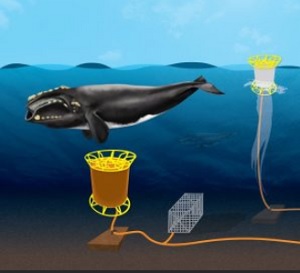
The future of fishing is innovation.
Maine’s lobstermen begin 2022 with a unique opportunity to fundamentally solve the whale entanglement issue. Throughout history technology has been used to improve our lives and solve complex problems. Invention has brought us cell phones, computers, satellites, and soon, self-driving cars and a base on the moon. >click to read< By Zack Klyver 10:55
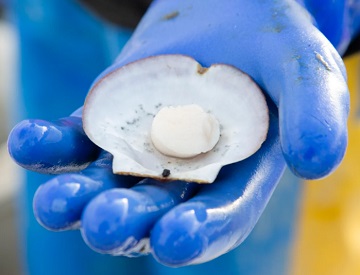
As Maine’s climate changes, scallop farming offers optimism
“One of the reasons we started farming scallops was because even though there’s a hesitancy for most people to admit it, there’s an awful lot of storms on the horizon for the lobster industry,” said Alex de Koning, of Bar Harbor-based mussel and oyster farm Acadia Aqua Farms. “It’s a tough nut to crack, but if you crack it, your potential benefits are just tremendous.”,, Marsden Brewer, owner of PenBay Farmed Scallops in Stonington, has been a commercial fisherman for most of his life. When his son, Bob, was in high school, Brewer worried about what the future would hold. Neither ground fishing nor lobstering seemed like a stable occupation,,, “I got tired of worrying about limitations,” he said. “I wanted to do something where I could maybe realize my potential.” >click to read< 13:11
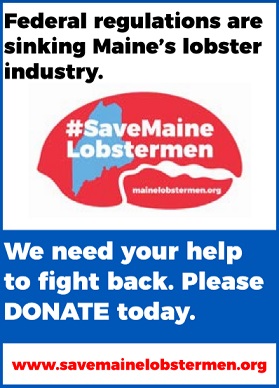
Lobster fishing being threatened
Commercial fishing, in particular, lobster fishing is an integral part of our local community and the economy of our state. This way of life is being threatened by new burdensome federal regulations. Over time, this will drive many fishermen out of business and forever change the character of the Maine lobster industry and our community. These regulations are championed as a way to help protect the North Atlantic right whale but will fail to do so. We have to fight back against this regulatory onslaught. >click to read< by Troy Plummer and Mark Jones, and please click and donate to www.savemainelobstermen.org, if you can!
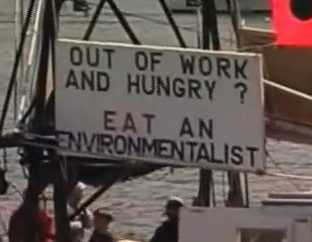
Oh sure! Trowels, Not Traps: PETA Proposes New Jobs for People in the Lobster Industry
The U.S. Supreme Court just denied a request by the Maine Lobstering Union to lift a ban on lobster fishing in the Gulf of Maine between October and January, which was enacted to protect endangered North Atlantic right whales from becoming fatally entangled in fishing gear and ultimately going extinct, so this morning, PETA sent a letter to the union’s CEO, Mike Yohe, dangling a lifeline. Because people in the lobster industry complained that the ban threatens their livelihood, PETA is offering to help cover the cost of retraining them in nonviolent occupations, including photography and gardening. >click to read< 14:55

Fed appeals court reinstates lobster gear restrictions off Maine’s coast
A federal appeals court is reinstating restrictions on fishing gear in a nearly 1,000-square-mile swathe of ocean off Maine’s coast. In October, in an effort to protect the roughly 340 right whales remaining on the planet from potentially deadly entanglements with fishing gear, the federal government imposed a four-month restriction on the use of trap-rope in the area. Before the restrictions took effect, the Maine Lobstering Union won a stay from a U.S. district judge in Bangor. But Late Tuesday, a federal appeals court in Boston ruled that the lower court overstepped its authority. >click to read< 10:16

Rep. Sherm Hutchins – Maine’s lobster industry is under siege
Maine’s lobstermen and women are under attack by the Biden Administration after a recent set of rule changes restricting seasonal lobster fishing in 950 square miles of federal waters off Maine’s coast. This is an inflexible and poorly considered attempt to protect the North Atlantic right whale population. The series of rule changes are the most heavy-handed in a long line of attempts to undermine the lobster industry here in Maine. If our fisheries are not protected, and if these rules are not reversed, Maine’s fishermen and women will not recover. >click to read< 09:47
More siege from the non-productive slugs of the enviroscam movement – Zack Klyver, science director with the group Blue Planet Strategies, has a different view on the issue. I’m sympathetic to them and know that they work extremely hard,,, >click to read< 11:25

Ronald R. Fatulli, Lobsterman/Businessman of Middletown, RI, has passed away – Worked seven days a week.
Ronnie was born and raised in New Bedford, MA to the late Raymond and Jennie (Salvati) Fatulli. He served in the United States Army, stationed in Alaska. When Ronnie returned home, he quickly found opportunities through his dedicated hard work. He bought a small lobster boat and sold sandwiches to the sailors at anchor on Navy ships stationed in Newport. In 1959, he founded the Aquidneck Lobster Company and soon grew from one small lobster market to becoming the largest East Coast wholesale distributor. The Bowen’s Wharf location became their foundation in 1965, then expanded further with the Coast Canning Company. Ronnie had an understated personality, and spoke loudly with his immeasurable work ethic. He worked seven days a week for his entire career. He was known for his tough love, and if he gave you a shot, he wanted you to succeed. >click to read< 15:15

Lobster industry is anxious over upcoming North Atlantic right whale protection rules
The federal government is working on new rules designed to reduce risk to North Atlantic right whales,,, One of the threats the whales face is entanglement in ropes that connect to lobster and crab traps in the ocean. Early indications show that the changes required by the rules could be significant. They’re also vulnerable to ship strikes, and face the looming threat of warming oceans. Acting NOAA Fisheries Assistant Administrator Paul Doremus said in June that the U.S. and Canada, which also harvests lobsters, must “take and sustain additional efforts to reduce right whale mortalities and serious injuries.” >click to read< 10:39
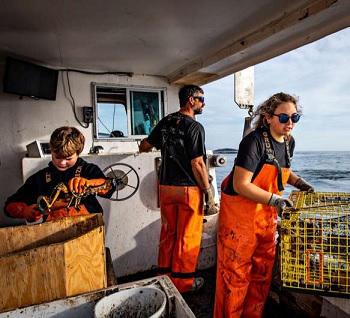
Maine’s having a lobster boom. A bust may be coming.
The waters off Maine’s coast are warming, and no one knows what that’s going to mean for the state’s half-billion-dollar-a-year lobster industry, the largest single-species fishery in North America. Some fear that continued warming could cause the lobster population to collapse. The Gulf of Maine, an ocean body brimming with marine life, is cradled by Cape Cod in the south and the Bay of Fundy in the north, and bounded in the east by two underwater shoals, George’s Bank and Brown’s Bank. In 2015, climate scientist Andy Pershing, formerly of the Portland-based nonprofit Gulf of Maine Research Institute, published a paper in Science concluding that the gulf was warming faster than “99% of the global ocean.” That eye-popping revelation was enough to keep fisheries managers and a whole lot of Mainers awake at night. >click to read< 16:27
Fox News, and Maine lobsterman Kristan Porter brings Right whale “conservation” issue to the American public
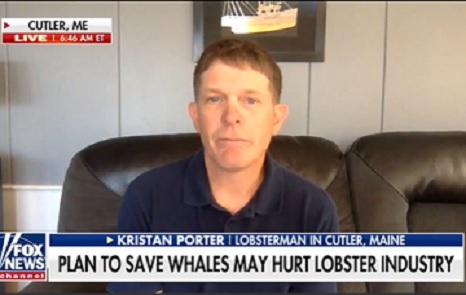 Jun. 13, 2021 – Cutler, Maine lobsterman Kristan Porter explains how a federal whale conservation push could have a massive effect on the lobster industry >click to watch< 07:50
Jun. 13, 2021 – Cutler, Maine lobsterman Kristan Porter explains how a federal whale conservation push could have a massive effect on the lobster industry >click to watch< 07:50

Time to hit the brakes on offshore wind farms
2017, offshore wind generation appeared to be a dead issue in Maine. The Public Utilities Commission (PUC) had just completed an extensive study that deemed it too expensive for ratepayers. Now it is moving again at the speed of light. What I would like to know is, why haven’t we started an independent study on the environmental impacts of offshore wind development? We have been told that we need to move quickly given the Governor’s ambitious goals. I have heard this repeatedly and from many people in the Legislature, the bureaucracy, special interest groups and from high-paid lobbyists working for foreign corporations. Where did these goals come from, and why are we using these goals as a target? >click to read< 16:55

Richard “Max” Strahan attempted to intervene in right whale case with court injunction
An animal rights activist made a late attempt to try and stop the industry from being allowed to use vertical buoy ropes. Richard “Max” Strahan tried to intervene at the beginning of the month in the federal right whale court case that holds the future of the lobster industry in its hands, but the activist’s attempt was rejected by a judge less than a week later. Strahan filed his motion on May 8 and claimed that the only way the industry would stop using the ropes is by a court-ordered injunction. >click to read< 16:03

Well, hush my puppies! Georgia Con groups boycott New England Lobster Industry
Maine’s lobster industry is keeping a wary eye on a consumer boycott launched in the state of Georgia. Conservation groups there charge that New England’s lobster gear and trap-rope risk entangling and killing endangered right whales, and they say seafood lovers should choose other options. Alice Keyes, the coastal conservation director for an organization called 100 Miles, so-named for Georgia’s hundred-mile shoreline. The campaign is called “Eat Local, Not Lobster”. “I hope consumers are smarter than falling for these false campaigns,” says Patrice McCarron, the Maine Lobstermen’s Association executive director. >click to read< 09:25
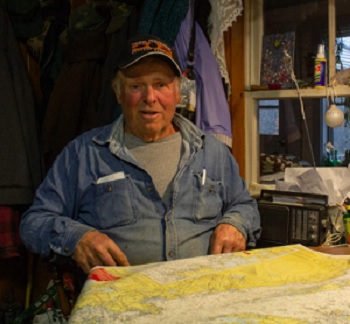
Fishermen, DMR: New North Atlantic Right Whale regulations could cripple lobster industry
The proposal, released in late December 2020, includes measures like regional gear marking, breakaway rope, extra traps per trawl line and restrictions on certain fishing areas. But it is the emphasis placed on ropeless fishing traps that has officials at the Maine Department of Marine Resources most concerned. In its Biological Opinion regarding right whales and the fishing industry, NMFS identifies ropeless fishing as a solution, among others, to reduce whale entanglements that cause death or serious injury. DMR argues that ropeless gear is largely under-researched and unaffordable. DMR used EdgeTech traps to estimate cost increases associated with converting to ropeless fishing,,, An EdgeTech fishing unit costs $3,750, >click to read< 19:36
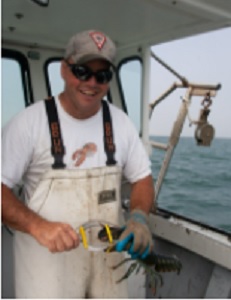
Massachusetts Lobstermen fear end of their livelihood
Dan Pronk is worried a new set of proposed NOAA and NMFS restrictions aimed at saving the North Atlantic right whale could be the nail in the coffin for the lobstering industry on Nantucket. “We’ve got five years left of lobstering down here,” said Pronk, the only commercial lobsterman on Nantucket, and one of only a handful of lobstermen around the region with traps south of Nantucket and Martha’s Vineyard. “It’s career ending if they get their way. We’re bending over backwards to appease these people. >click to read< 13:28
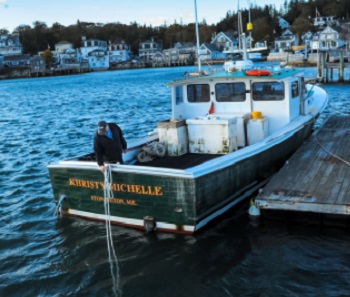
Despite an uncertain start to the fishery’s season, Maine lobster rolls on as the industry pivoted to new markets
Stonington lobster fisherman John Williams usually hauls his boat out in February for annual maintenance and paint in preparation for the start of the spring fishing season. “Then COVID started,” The health emergency was worsening and the economy shutting down. That included one of the lobster industry’s biggest markets — restaurants. The large cruise ship and casino markets also slammed shut. International freight and shipping to China, emerging as a large consumer of lobster, had nearly stopped. “I got thinking about it and said, ‘This doesn’t look very good. We won’t have any market,’” Williams says. >click to read< 10:31
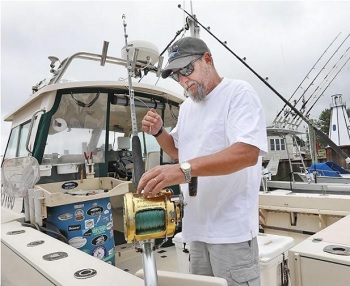
Do you think your seafood is cheaper? It is. The Coronavirus pandemic caused a drop in demand
The ongoing pandemic has impacted nearly every aspect of life on the South Shore, including the commercial fishing and lobster industries. “It’s hurt them big time,” said retired Cohasset fisherman Matt Marr. “There are so many things that factor in. Most of the restaurants are closed, hotels are empty, casinos are empty, cruise ships don’t exist anymore. Those places bought a lot of lobster. So, their markets have definitely diminished.” Reduced business at restaurants has caused a significant drop in demand, said Tommy Alioto. The pandemic didn’t affect lobstermen’s ability to do their job, but the low demand caused an excess of inventory and a drop in price. >click to read< 15:30
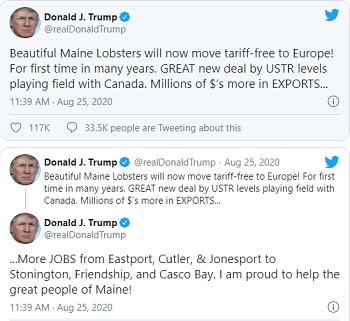
USDA trade aid for lobster industry using coronavirus coffers
The Trump administration is committed to starting an aid program to help the struggling lobster industry, Agriculture Secretary Sonny Perdue said Wednesday, but the funds to do so will come from the coronavirus stimulus package, not the aid used to bail out farmers after President Trump’s trade war with China. The lobster industry, like many others during the coronavirus outbreak, has seen losses as markets on cruise ships and restaurants evaporate.,, Trump has began paying considerable attention to Maine’s lobster industry starting this summer, traveling to Bangor in June to announce he would reverse protections for the Northeast Canyons and Seamounts Marine National Monument. >click to read< 18:07

New England: Judge Says He’ll Decide Within 2 Weeks When Feds Issue New Right Whale Protection Rules
The federal government and the lobster industry say any change should wait until May 2021 to allow for full review and public comment on new rules once they are proposed. In oral arguments before U.S. District Court Judge James Boasberg Monday, their lawyers argued that the courts should not be in the business of micro-managing the fishery.,, The conservation groups are also calling for an immediate and year-round ban on fishing with rope in an area off Nantucket where the whales have been congregating in recent years. But a lawyer for the Maine Lobstering Union, Alfred Frawley, argued that would cause unwarranted economic harm, because the whales are known to be present mostly for a limited period in the spring. >click to read< 08:14
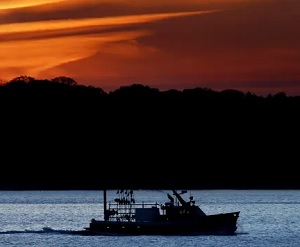
‘We have no market, but lots of lobsters’: a Maine lobsterwoman fights for her livelihood
“If I’m not fishing, I’m working on gear or my boat. Or meetings involving fishing. It’s what I eat, sleep and breathe,” lobsterwoman Julie Eaton tells me.,, I ask her what it’s like to start lobster season. “How do I even begin to tell you what it feels like?” she says, sighing. “It feels like I’ve held my breath all winter. Finally, when I turn the key to my boat and I’m going across the bay, my lungs fill with air for the first time in months. All of a sudden I feel alive.,,, “The pandemic is killing us,” Julie Eaton tells me. “It’s a terrible thing. We have no market, but lots of lobsters. We’re safe to fish on our boats. On my boat, it’s just me and my stern-woman. But I have no place to sell my catch! >click to read< 08:44
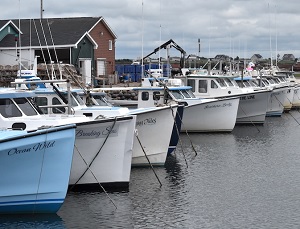
Malpeque harbour users vote in favour of new wharf at Cabot Shores
On Wednesday, July 8, Malpeque harbour users gathered in Summerside to hear proposed plans for a new wharf. Around 50 people attended the presentation given by Harbourside Consulting and MRSB, which was hosted by the Malpeque Harbour Authority before its annual general meeting. Most there were commercial fishers; some were members of the public. The navigational channel into Malpeque harbour, also called Malpeque Cove, is shallow and has needed near-constant dredging for decades. The shallow channel is dangerous for boats and their crews who risk running aground, swamping full of water or capsizing. >click to read< 08:09

Atlantic Canada Fish harvesters still waiting for federal Coronavirus aid to flow
As the policy analyst for CFIB in P.E.I., in early May I worked with my colleagues to write a letter to the Minister of Fisheries and Oceans and Member of Parliament for Nova Scotia’s South Shore, Bernadette Jordan. This letter pleaded for help for fish harvesters, the folks who risk their lives on the water harvesting one of Atlantic Canada’s most important resources and exports, lobster. Lobster harvesters were deeply concerned about a quickly evaporating market and a glut of product driving down the price of their livelihood.,, While this was going on, the federal government was rolling out its array of programs to subsidize business: the Canada Emergency Business Account (CEBA) , the Canada Emergency Response Benefit (CERB), the Canada Emergency Wage Subsidy (CEWS) and the Canada Emergency Commercial Rent Agreement (CECRA). by Marley Kingston >click to read< 07:43
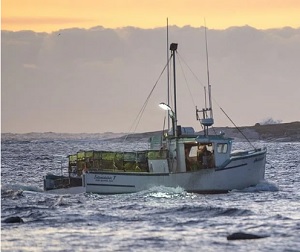
“Things could’ve been way worse”: Spring lobster season nears end amid coronavirus, “Things are stabilizing”
The Maritime Fishermen’s Union predicted a gloomy forecast for the spring season with the pandemic’s safety concerns, crushed markets and reduced processing capacity. But fishermen are taking it “day-by-day,” says the union’s executive director. “Things could’ve been way worse,” says Martin Mallet. “At least our fishermen have had a chance to go out and catch part of their catch.” Restaurants reopening is also helping market demand increase. >click to read< 08:49






